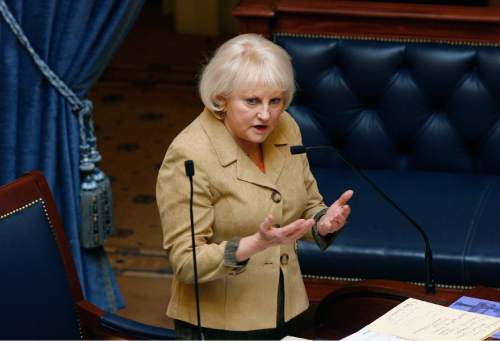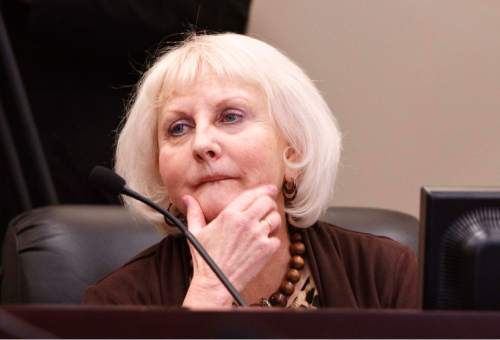This is an archived article that was published on sltrib.com in 2015, and information in the article may be outdated. It is provided only for personal research purposes and may not be reprinted.
State Sen. Todd Weiler is from Woods Cross. But in his four years in the Legislature, he's felt like a Millcreek councilman because he's been called on so often to help sort out Salt Lake County's internal boundary issues.
And he's sick of it.
"Why do we have to deal with this every session?" he asked last week when the Senate Business and Labor Committee considered SB199, the latest effort to resolve decades of local government boundary disputes within Utah's most populous county.
"Because we haven't come up with a solution," responded County Deputy Mayor Nichole Dunn. "Hopefully, this is it."
She then outlined several ways in which the 225-page bill, sponsored by Sen. Karen Mayne, D-West Valley City, resolves longstanding problems while giving 160,000 unincorporated-area residents two assurances they have said repeatedly they want: the ability to protect a solid tax base to maintain current levels of government services and the right to self-determination.
"No longer will they have to choose between current services and more local control," Dunn said. "It's a workable, common-sense solution."
The committee agreed, forwarding the bill to the full Senate on a 3-0 vote.
One important advantage this approach has going for it, Dunn said, is that the bill was developed during the past year by an array of community leaders working closely with county Mayor Ben McAdams and his staff.
And although two representatives of the Utah League of Cities and Towns expressed reservations about the measure and its potential statewide impacts, it received support at the legislative hearing from Salt Lake City and Sandy, the two valley cities with the greatest geographical contact with the unincorporated county.
Sandy has unincorporated islands within its boundaries (White City) and along its fringes (Willow Creek and Granite). Salt Lake City shares borders with Millcreek and Magna townships.
"This is an incredibly bold attempt to take 40 years of challenge and put it into a document," said John Hiskey, Sandy's deputy mayor, who noted that annexations and incorporations were perplexing issues 28 years ago when he was a Salt Lake City official.
Added David Everitt, Salt Lake City Mayor Ralph Becker's chief of staff: "It's not a perfect bill … but it does bring a degree of flexibility and certainty to a process that's long had a lot of uncertainty to it."
While it carries the innocuous title "Local Government Revisions," SB199 is really a groundbreaking measure, "one of the hardest bills the Legislature has had to deal with," Mayne said. "This is good government. This is democracy at its best. We are changing government."
The bill would create a new form of government — a metro township whose boundaries would be protected from annexations, although it would allow a city to annex all or part of unincorporated islands or peninsulas if the county and the city agree it would be a good move. The township also would have authority to enact local ordinances and oversee planning and zoning matters.
In November, if the bill passes, the metro township idea will be put to a vote.
Residents in each of the six existing townships — Millcreek, Magna, Kearns, White City, Copperton and Emigration Canyon — would be given a choice: Do you want to be part of a metro township or a city? For people living in unincorporated areas that are not part of a township, such as Willow Creek, the question would be whether to remain unincorporated or to annex into a city.
Communities that vote to join a metro township would have a second choice: whether to join a Greater Salt Lake Municipal Services District, which Salt Lake County is setting up to deliver public-works services — such as snowplowing and street lighting — in the unincorporated area.
Those that join later would elect a local township council, including one member who would serve with other township representatives on a broader board governing the service district.
An area that votes to become a city instead of joining the metro township still could opt to remain in the service district on a contractual basis, in the same way that some cities don't have their own fire departments but pay the Unified Fire Authority for their coverage.
Brett Helsten has been working with McAdams' team for the past year, ever since the Legislature passed an earlier bill freezing the unincorporated area boundaries so this bill could be developed.
He said the measure would protect the financial integrity of Kearns, which is essentially built out and unable to create its own self-supportive commercial center "without taking out houses and parks." With this legislation, Helsten added, "if we do have economic development, we won't have to worry about a neighboring city annexing it away from us."
Former legislator Lamont Tyler also spoke in favor of this approach, as did Rick Raile, chairman of the unincorporated area's Community Preservation Committee. The bill would maintain community history, Raile said. "Nothing's ever perfect, but this is as close as we can get to making everyone happy."
Well, not everyone.
Bill Both from Magna believes the proposed changes are too momentous to be voted on in November and that the measure should go on the ballot in a presidential-election year, when there would be a larger voter turnout.
Millcreek resident Doug Fullmer said he doesn't want anything to change and that the local government setup should be left the way it is, citing the decisive defeat two years ago of an effort to create a Millcreek City..
Meanwhile, Cameron Diehl and Jodi Hoffman of the Utah League of Cities and Towns cited a number of concerns about the bill, including the fact that its details emerged only midway through the session, which ends March 12.
Weiler assured them that the measure's contents will be subject to considerable scrutiny as it wends its way through the full Senate and then, if passed, on to the House.
But he suggested his qualms about having to deal with the issue once again were diminished by the results brought forth by the McAdams administration.
"I had the pleasure of working with Mayor McAdams for a year in the Senate and practiced law with him at the same firm before that," Weiler said. "I don't know of an elected official who is more open, more willing to compromise. If you can't work with Ben McAdams, good luck finding an elected official you can work with."
When the session resumes Monday, SB199 will be deep down on the Senate's list of bills to take up.
Twitter: @sltribmikeg





